TANZANIA UPDATE: I bring good news of great joy. FEAR NOT! by Cynthia Holder Rich
In our first foray in international mission service we moved to Madagascar in 1998 with our young family. I had been serving as pastor of a congregation in Illinois, where I left a group of great people with whom I had wonderful friendships. Many members followed our life and work overseas, sending words of encouragement and much-appreciated care packages. One friend was particularly fascinated, sending lots of questions and comments on what we shared. We had a lively correspondence, the kind that we who live and serve far from both family and all things familiar really enjoy.
In the same year, Barbara Kingsolver’s novel The Poisonwood Bible was published. The story of the Price family,  posted to the Congo before independence, became very popular in the US and encouraged many to reflect on what mission is/was about. The protagonist, mission pastor Nathan Price, wants to “save Africa for Jesus”. His mission fails, in part because he encourages people to accept baptism in a crocodile-infested river. The rest of the family eventually leave Congo, having had a perfectly horrible experience (including one child’s death), abandoning Nathan to his weird obsessions about his misguided work. Some used the publication of the book as a convenient opportunity to take part in what they were already predisposed to do: denigrate all mission activity and all missionaries. According to those in this camp, all mission personnel were no more than dense and ridiculous blunderers, people who dismissed and decried local cultures and ritual life while imposing their own cultural values and religious sensibilities in ways that were colonial and imperial. End of story.
posted to the Congo before independence, became very popular in the US and encouraged many to reflect on what mission is/was about. The protagonist, mission pastor Nathan Price, wants to “save Africa for Jesus”. His mission fails, in part because he encourages people to accept baptism in a crocodile-infested river. The rest of the family eventually leave Congo, having had a perfectly horrible experience (including one child’s death), abandoning Nathan to his weird obsessions about his misguided work. Some used the publication of the book as a convenient opportunity to take part in what they were already predisposed to do: denigrate all mission activity and all missionaries. According to those in this camp, all mission personnel were no more than dense and ridiculous blunderers, people who dismissed and decried local cultures and ritual life while imposing their own cultural values and religious sensibilities in ways that were colonial and imperial. End of story.
SO, when my Illinois friend wrote that she had just completed The Poisonwood Bible, and that she now understood SO MUCH MORE, SO MUCH MORE DEEPLY, about what we were up to in Madagascar—I spent days in something of a foul mood.
 Last week, I had moments to reflect on these events when another “missionary”, not a fictional character but all-too-real, died after attempting to “bring the Gospel” to what he called “the last stronghold of Satan”. Repeatedly and illegally visiting an island that the Indian government had long listed as out of bounds for any except its inhabitants, white US citizen John Allen Chau came close to inhabitants, yelling at them (presumably in English, which islanders do not speak) that Jesus loved them, and finally paid people to drop him off on shore. When his transport team came back the next morning, they witnessed his body being buried on the beach.
Last week, I had moments to reflect on these events when another “missionary”, not a fictional character but all-too-real, died after attempting to “bring the Gospel” to what he called “the last stronghold of Satan”. Repeatedly and illegally visiting an island that the Indian government had long listed as out of bounds for any except its inhabitants, white US citizen John Allen Chau came close to inhabitants, yelling at them (presumably in English, which islanders do not speak) that Jesus loved them, and finally paid people to drop him off on shore. When his transport team came back the next morning, they witnessed his body being buried on the beach.
Responses have been quick and predictable.
Some have called Chau a martyr, and have reminded us that missionary work is dangerous.
Others have decried his missionary quest, pointing out his missiological errors.
Still others have found a new opportunity to raise questions about the whole mission enterprise, questions that the  work of authors like Kingsolver and James Michener (check out the Rev. Abner Hale in Hawaii for another exemplar of the missionary fool, and for narratives of disease epidemics brought by Europeans which echo current concerns for people on the island Chau sought to visit) raised in other eras.
work of authors like Kingsolver and James Michener (check out the Rev. Abner Hale in Hawaii for another exemplar of the missionary fool, and for narratives of disease epidemics brought by Europeans which echo current concerns for people on the island Chau sought to visit) raised in other eras.
As our professional lives have been defined in many ways by international mission service, this is a painful moment.
To be sure, we grieve for those who loved John Allen Chau. Advent is marked for them, this year and in years to come, by this loss.
And, in Advent, we who follow the Prince of Peace must contemplate what it means to bring ‘good news of great joy” to all.
Mission is about bringing this news. As we tell our students, the bringing of this news, whether in preaching, teaching, or living testimony in service and ministry—the bringing of this news must be done in the best, most skilled ways the gifts God has given make possible for each of us. We cannot afford to be boring, slipshod, or unprepared. We are bound—obligated—called to do our best in bringing the best news that ever was.
(And yes, friends, we can tell stories of being unprepared when the Spirit bailed us out. These stories do not provide an excuse to be unprepared. They are evidence of the amazing grace of our loving, compassionate, understanding and forgiving God, not a foundation on which to build a life of ministry, witness and service.)
Here in Tanzania, we serve among people whose lived memory of brutally formational colonization colors the way they understand the Gospel. As those who brought the good news came with the colonists—and sometimes, collaborated with the colonizers with the aim of benefitting European powers and robbing Tanzanians—the good news they brought came with baggage. Patriarchy, misogyny, hatred and demonization of the other, a high value on whiteness and lighter-colored skin tones, and a love for submission that was built into church practice and doctrine—all of these and more came with the good news.
The good news is that this good news—the news brought by angels to Mary, Joseph, shepherds, Elizabeth, John, and the Magi and a host of others—the same good news brought to nearly every corner of this wide earth—this good news is sufficiently powerful that it has and does shine through the many layers of twisted stuff that has come with it.
The bad news is that the twisted stuff is often understood as and confused with the good news.
Many of our students have identified and are writing about particularly Tanzanian ways of understanding and seeing the Gospel at work, assiduously removing layers of cultural baggage to find the treasure within. This is God’s doing and it is amazing before our eyes. In a context where many kinds of oppression and injustice rip voice, life and health from people, the amazingly visible, tangible, and transformational good news is sure and true, making a real difference. To see our students working to find and proclaim it is awe-inspiring.
To be in mission means to walk with people as they discover and join in this work. To be in mission is to glory in and to point out what God is doing and how Jesus is changing lives and giving life. To be in mission is to open oneself to learning—to correction—to confession and repentance when one has wronged others, no matter the cause. To be in mission is to live the good news, focusing on Jesus and following his example of loving all, breaking every boundary, and standing with outcasts and all those the world excludes. To be in mission is to fear not.
All who follow Jesus are called to mission. Twisted cultural baggage confused with the good news is not a problem particular to Africa or to poor communities. Colonized minds, belief systems and theologies/ideologies can be found everywhere the good news has been proclaimed—not just in Tanzania. Naming injustice and lifting up those who are oppressed—Jesus calls all disciples to this work. All who follow Jesus are sinners. To be in mission, wherever one lives and serves, means being committed to continued learning, listening, and growth toward authentic sharing of the Gospel’s truth. To be in mission is to answer the call to turn away from fear and toward the love Jesus calls us to share.
As Advent dawns, we recommit to bringing Jesus’ good news in the best ways we can discern, and to continue to grow in our abilities so to do. In a broken and fearful world, we are given courage by the Spirit for this work. All with whom we are in mission—those here in Tanzania, our mission colleagues near and far, and all of you who follow and support our work—help us to continually grow in our understanding of what mission is. We look forward to a year of growing in this knowledge together. Thanks for sharing this sacred journey with us.
Advent blessings! Good news of great joy to you! Fear not!

